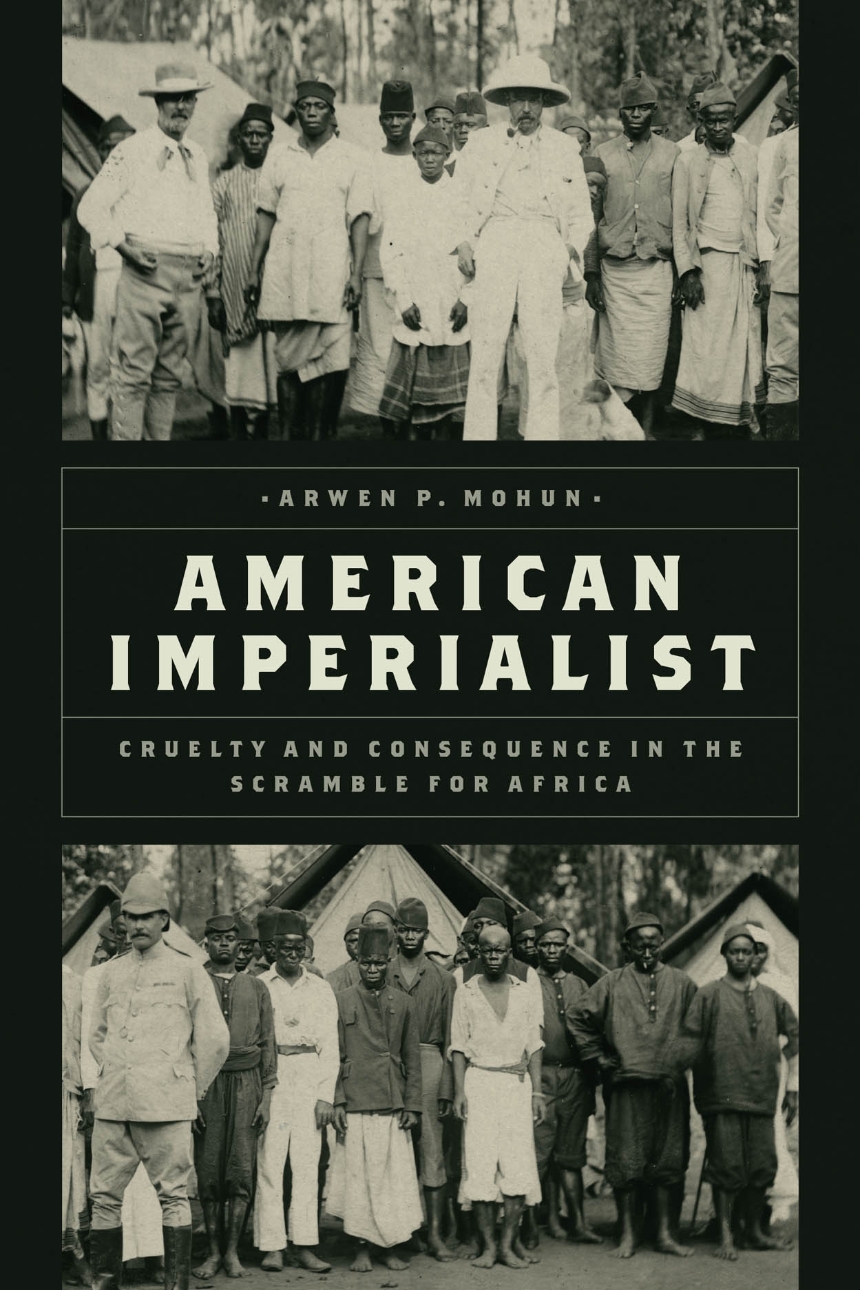American Imperialist
Cruelty and Consequence in the Scramble for Africa
Richard Dorsey Mohun spent his career circulating among the eastern United States, the cities and courts of Europe, and the African continent, as he served the US State Department at some points and King Leopold of Belgium at others. A freelance imperialist, he implemented the schemes of American investors and the Congo Free State alike. Without men like him, Africa’s history might have unfolded very differently. How did an ordinary son of a Washington bookseller become the agent of American corporate greed and European imperial ambition? Why did he choose to act in ways that ranged from thoughtless and amoral to criminal and unforgivable?
With unblinking clarity and precision, historian Arwen P. Mohun interrogates the life and actions of her great-grandfather in American Imperialist. She seeks not to excuse the man known as Dorsey but to understand how individual ambition and imperial lust fueled each other, to catastrophic ends. Ultimately, she offers a nuanced portrait of how her great-grandfather’s pursuit of career success and financial security for his family came at a tragic cost to countless Africans.
Reviews
Table of Contents
List of Illustrations
Prologue
1: African Connections
2: Africa in Mind
3: The Journey Up-Country
4: Arab Encounters
5: The Messy Business of Hero Making
6: A Hero’s Welcome
7: The Consular Life
8: Infrastructures of Empire
9: Facts on the Ground
10: The Truth about the Congo
11: Manifest Destiny
After Africa and Conclusion
Acknowledgments
List of Abbreviations
Notes
Index
Excerpt
He’d never intended to work for the Belgian king. But intentions aren’t actions. Still, a few years earlier, he had turned down Leopold II’s first job offer. The accusatory voices of journalists, friends, and reformers reinforced his reluctance. He recognized the truths in their dark stories. The king’s eloquent promises of free trade and an end to slavery amounted to a clever ploy, strategies designed to appease his European and American critics. Leopold’s real goals were profit and control. The king’s priorities mirrored those of many of the men who found their way into his private African colony, the Congo Free State.
During a stint as the US Trade Agent in Congo, he’d seen with his own eyes unfettered greed and cruelty as Europeans scrambled to enrich themselves. More than seen, really. He’d done things that he now preferred to keep quiet: burned villages, brutalized men in his employ, stood by while innocent people were killed for acts they had not committed.
Since then, he’d married, become a father, gained some prudence. He had not, however, mustered the courage to completely cut ties with Leopold. Now he was a breadwinner with what felt like limited options. The financial security of a multiyear contract would be a relief. Surely, family responsibilities mattered more than taking a vaguely humanitarian stand by avoiding any more involvement with the Congo Free State, as his friend Roger Casement had done. If he was honest with himself, he also itched for a challenge. Perhaps he thought he could do better than the other men in the king’s employ. The decision was made: work for Leopold in Africa.
This is how I imagine my great-grandfather, Richard Dorsey Mohun, known as Dorsey, in the spring of 1897: a tall, narrow-shouldered man hunched over his desk, weighing his options. His sweat-soaked white shirt hangs limply beneath his stiff collar. The steady pounding of monsoon rains unleashes a torrent down the street outside. He doesn’t notice. By now the discomforts of tropical places seem all too familiar. He has spent the past few years in this job, which he now disdains, sitting in the US consular office in Zanzibar’s Stone Town, writing reports and dealing with the problems of stranded sailors and dwindling American trade. Rich lunches and rounds of drinks at the English Club have softened the boredom but widened his girth. Multiple bouts of malaria bloat his features. He is weary. In photographs from the time, he looks older than his thirty-three years.
He is not alone in the consular office. Noho bin Omari is there. Dorsey does not understand Swahili or Gujarati or most of the dozen or so languages that echo through Stone Town. He relies on Noho to translate, not just words but meanings. Like many of the Africans with whom Mohun worked, Noho’s voice is elusive. Perhaps his descendants continue to tell Noho’s story. Perhaps the American consul doesn’t matter at all in how they remember their ancestor’s life.1 Ironically, Noho bin Omari’s name survives in US records because Dorsey’s successor initially suspected Noho was a fiction. He believed Dorsey pocketed the money provided by the State Department for translation and invented Noho to cover his tracks. That was before Noho presented himself to the new consul with two years of receipts in hand.
If you dig into the past, you’d better be prepared for what you find there. Initially, I was ill prepared to contend with an ancestor who in-controvertibly and knowingly chose a path along the wrong side of history. I also did not imagine that poking around in family history would yield an extraordinary story of one man’s involvement in one of the most notorious episodes in the European scramble for Africa: the short and brutal tenure of the Congo Free State, an enormous private colony in the center of the continent. Or that his story would reveal the remarkable influence of American money and expertise in the “new imperialism” of the late nineteenth and early twentieth centuries. But it did. As a result, this book is a history of how several generations of Americans shoved their way around Africa, sometimes meaning well but too often leaving a trail of destruction behind them.
